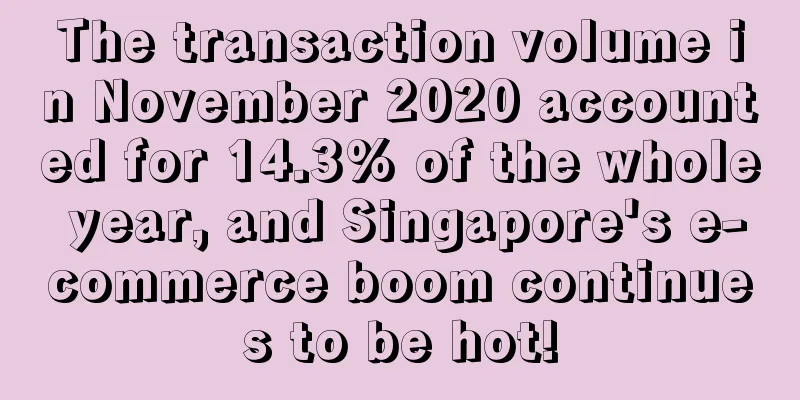The transaction volume in November 2020 accounted for 14.3% of the whole year, and Singapore's e-commerce boom continues to be hot!

|
Therefore, Singapore is also an e-commerce market that several international e-commerce giants are scrambling to get their hands on. Currently, Singapore has identified key e-commerce infrastructure that may pave the way for the development of global and regional e-commerce. It is understood that these infrastructures include the establishment of local 5G networks, supply chain functions and payment platforms. Other data showed that driven by the COVID-19 pandemic, online transactions in Singapore in November 2020 accounted for 14.3% of the total sales for the year, higher than 5.8% in January. Singapore's Minister of Industry and Trade said that even after Singapore lifted its lockdown facilities in mid-2020, consumers' online shopping levels remained high. This shows the strong development of online business in Singapore, and it is expected that consumers' shift to online shopping behavior will continue for a longer period of time. To continue this momentum, the Singapore government will improve capabilities in areas such as digital infrastructure, supply chain resilience, cybersecurity and cross-border alliances. For example, in recent years, Singapore has invested in digital connectivity, data analysis and payments to enhance its digital infrastructure, especially 5G networks, which may become the core of Singapore's digital economy. Singapore's Minister of Industry and Trade said that two nationwide 5G networks are planned to be up and running by 2025, and 5G network coverage will reach 50% by 2023 , which will enhance the ability of businesses doing business online to handle large e-commerce orders. In addition, the Singapore government has launched various assistance programs to help SMEs adopt digital technologies to conduct online business. Last year, the Singapore government also collaborated with e-commerce platforms such as Amazon to launch a number of programs, including an e-commerce booster package. In addition to basic software applications, logistics is also a focus of the government and small and medium-sized enterprises. Singapore's Minister of Industry and Trade said that Singapore's logistics sector also needs to enhance the adaptability of its supply chain to ensure that the requirements of all online orders are met. After all, during the epidemic, we all saw the impact of global supply chain disruptions caused by border closures and various export restrictions, as well as a series of logistics problems. policy Cross-border e-commerce market Singapore |
<<: South Korean retail giant E-Mart may form an alliance with South Korean IT giant Naver
>>: The number of shopping app sessions in the United States grew 66% in Q4 2020
Recommend
Up to 3 million! Guangzhou cross-border e-commerce special subsidies are here
Recently, the Guangzhou Municipal Bureau of Comme...
Become the top three on Amazon! Another seller starts listing
Changzhou, Jiangsu has "grown" a cross-...
E-commerce orders in India increased 28% year-on-year in the first two days of the holiday season
According to the latest data released by software...
Take it off the shelves! Common styles can also infringe copyright, and many popular patterns cannot be used
Recently, two more brands filed infringement laws...
As Christmas approaches, UK toy market sales increase
This time last year, The NPD Group reported year-...
It’s settled! Amazon Prime Day 2022 is in July!
April 29, 2022, Shanghai — Amazon Prime Day 2022 ...
Lifting of US travel ban will boost retail sales
Starting this Monday, the Biden administration wi...
What is Tommaso? Tommaso Review, Features
Tommaso is a bicycle and accessories website that...
What is soulaca? soulaca Review, Features
soulaca is a business unit of Shineworld Innovatio...
What is Dims.? Dims. Review, Features
Dims.'s core wood furniture collection is mas...
What is Chubb Limited? Chubb Limited Review, Features
Chubb is the world's largest property and cas...
Erik Bicycle Sales Soar, BOPIS Sales Rise Alongside It
Erik's Bike Shop knew that demand for its pro...
Cainiao is expanding overseas at a rapid pace, accelerating the construction of North American networks
The straight-line distance from Shenzhen, China t...
XTransfer 2023 Foreign Trade Inclusive Finance Season concludes, ushering in a new era of "Future Foreign Trade"
Recently, the one-month "XTransfer 2023 Fore...
Big change! Amazon page updated again
Amazon has made another change: store pages have ...









